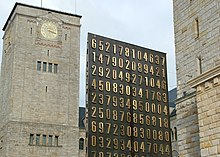Cryptology

The cryptology ( Greek κρυπτός kryptós "hidden, hidden, secret" and -logie ) is a science that deals with the encryption and decryption thus of information and the information security busy. Until the late 20th century, encryption methods were the only subject of investigation. With the establishment of electronic data traffic, other areas were added. These include digital signatures , identification protocols , cryptographic hash functions , secrecy sharing , electronic voting procedures and electronic money . Today, cryptology is divided into the subject areas of symmetric cryptography , public key cryptography , hardware cryptography and theoretical cryptology . Cryptology can also be divided into the two areas of cryptography (also: cryptography), the encryption of information, and cryptanalysis (more modern notation also: cryptanalysis), the extraction of information from encrypted information. This classification was developed by the Russian-American cryptologist William Friedman at the end of the First World War . He was responsible for both the definition of the terms and the differentiation between them. Following this, cryptography deals with the development and application of the individual procedures and cryptanalysis with their strengths and weaknesses. In other words, cryptography deals with the security of one's own secret communication, in particular against unauthorized decipherment or alteration, while cryptanalysis, as it were, as an opponent of cryptography, aims to break the security of communication. Cryptography and cryptanalysis are therefore also referred to as defensive and offensive cryptology. The associated restriction of the term cryptography is not always taken into account. Rather, the terms cryptology and cryptography are sometimes used equally.
The adjective cryptic is outside the scientific jargon used in a general sense of "unclear or ambiguous in the expression and therefore difficult to understand."
Kerckhoffs' principle
An important principle of modern cryptography is Kerckhoffs' principle. Accordingly, the security of a cryptosystem must not depend on the secrecy of the algorithm. Security is based on the confidentiality of freely selectable input variables of the algorithm. In the case of encryption methods, these are, for example, the secret keys .
Brief historical overview
Cryptology as a science has only existed since the 1970s, when Ralph Merkle , Whitfield Diffie and Martin Hellman published the first research papers on public key cryptography and thus established cryptology as a science. Previously, results on cryptography and cryptanalysis were kept under lock and key by governments and military organizations.
The International Association for Cryptologic Research (IACR) has been a scientific professional association for cryptology since 1982 . The IACR organizes cryptological conferences , publishes the renowned journal Journal of Cryptology and operates a. a. an electronic archive for scientific work in the field of cryptology.
See also
- List of cryptography files
- Enigma (example of an encryption machine)
Web links
- CrypTool - open source program for cryptography and cryptanalysis
- Overview and history of cryptology
- Cryptography with applications; PDF; 1.4 MB
- Link catalog on the subject of cryptography at curlie.org (formerly DMOZ )
Individual evidence
- ^ IACR workshops
- ↑ Duden vol. 5. The foreign dictionary. 1997. p. 457